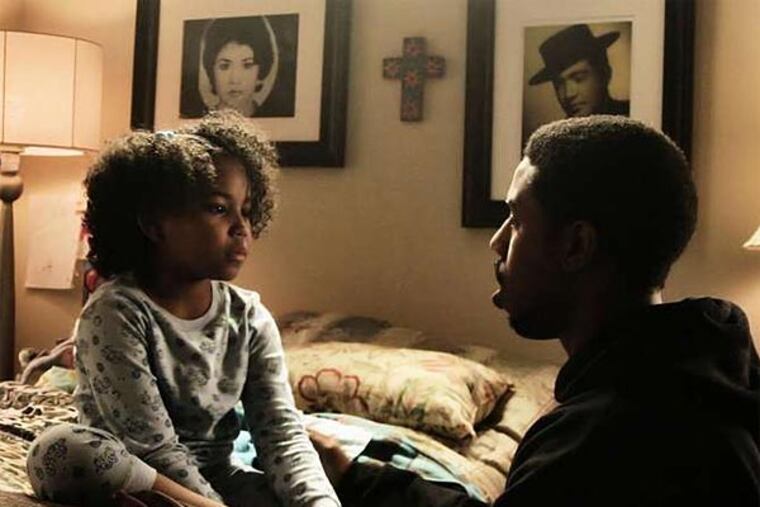On Movies: 'Fruitvale Station': Gritty tale of helplessness, humanity
'It was one of those dark places that sometimes you've got to go to as an actor," Michael B. Jordan says about the day, a year and a half ago, when he found himself face down on a train platform in Oakland, reenacting the death of Oscar Grant.

'It was one of those dark places that sometimes you've got to go to as an actor," Michael B. Jordan says about the day, a year and a half ago, when he found himself face down on a train platform in Oakland, reenacting the death of Oscar Grant. A 22-year-old who lived in the Bay Area's Hayward community, Grant was returning home from San Francisco, where he and friends had been watching fireworks. It was the early hours of New Year's Day, 2009, and in the chaotic aftermath of a disturbance on a subway car, Grant was shot and killed by a Bay Area Rapid Transit officer. Grant was unarmed. (The police officer was subsequently convicted of involuntary manslaughter.)
Witnesses watched from the train. Several captured the incident on their cell phones. Controversy exploded as the videos were shared on social media. Fruitvale Station, the powerful film in which Jordan stars as Grant, begins with footage from one of the cell phone recordings.
"We shot in that exact spot, over the exact brick, with the bullet hole still in the ground," says Jordan, whose performance as Grant is already, even in the thick of all the summer blockbusters, generating Oscar buzz. Fruitvale Station won both the Grand Jury Prize and the Audience Award for dramatic feature at the Sundance Film Festival in January.
"The experience of re-creating that moment, and knowing that this had all happened here - it definitely blurred the lines of reality," Jordan says. "Emotionally, it was the longest I've ever stayed in the moment like that. I remember being very scared."
The debut feature from Ryan Coogler - opening Friday at the Ritz Five - traces the 24 hours leading up to Grant's death on the BART platform. A young African American who had spent time in jail (felony drug convictions) and had worked in an Oakland supermarket, Grant had a girlfriend - played in the film by Melonie Diaz. Together, they were the parents of a little girl.
For Jordan, who is 26 and has been acting since he was 12 (his earliest credits include episodes of Cosby and The Sopranos), the chance to play Grant was a "no-brainer." Coogler was familiar with the actor from his work on HBO's The Wire (Jordan was Wallace, the wily teenage drug runner working for Avon Barksdale in the series' premiere season) and from TV's Friday Night Lights (quarterback Vince Howard). He had written the Fruitvale screenplay with Jordan in mind.
And he'd been looking to do a "gritty independent" - and you can't get much grittier than this.
Jordan, like a lot of other people, had followed the Grant story in the media. "I was living in L.A. at the time," Jordan says. "And I remember friends calling and saying, 'Hey Mike, did you see what happened?' People went on Facebook or YouTube and saw the videos. . . . I was angry. And I felt helpless. That could easily have been me."
A few years later, Jordan was given the opportunity to address those feelings of anger and helplessness. His portrayal of Grant is keen and complex - here is a guy who sold drugs, who had done time, who had cheated on his girlfriend. But who also was determined to put his life on track. He was devoted to his mother, to his daughter. He went out of his way to help friends and strangers alike.
"I felt this sense of responsibility," Jordan says on the phone from L.A.. "I can go out there and get this story told, and immortalize Oscar a bit, give him a little bit of his humanity back. That's something that Ryan and I really keyed in on while we were shooting. It was very important to us."
To prepare and research the role, Jordan spent time with those who had known Grant, with family members, with his daughter, his fiancé.
"Oscar was a people pleaser," Jordan says. "He wanted to please everybody. He was the best son he could be when he was around his mom. He was the best dad he could be when he was around his daughter. He was the best friend he could be, the leader of the group - he was the one that everybody looked to for an answer. . . . Or if there was trouble, he was the first one to handle it. He was that guy.
"And spending time with all these people was the only way we could get at a realistic picture. Not just asking one person what they thought, but getting all these different perspectives and blending them together into a portrait that we felt was as true as possible."
Jordan hopes that Fruitvale Station reaches a wide audience and gets audiences to ask questions - about race, about power, about fear and rage.
"I don't want anybody to look at this film and see a majority black cast and think this is a 'black' film," he says, "or that it's only really relevant to the people from the community where Oscar came from, where this all went down.
"That's not the case, at all. It's about humanity . . .. That's the message that we're trying to get across."